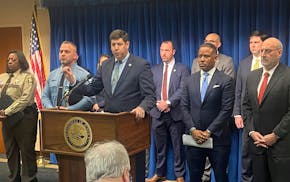Keenan Hartert has heard people say college students just need to get a job to work their way through college.
He's found it's not that simple.
The Minnesota State University Mankato professor noticed that some students who seemed engaged in class bombed tests, in part because of trying to balance full course loads with working more than 20 hours a week — whether on overnight hospital shifts or managing a Kwik Trip.
"I was floored at how normal they thought ... working 30 hours or more was," he said.
Hartert began researching his students' schedules, making connections between their hours worked and class performance.
He found that students who work more than 20 hours a week do significantly worse on tests and come to class less often; half of those low-attending students ended up failing his class, compared with just 7% of high-attending students.
From Mankato to Duluth, many Minnesota college students face the reality of having to work through college. As tuition at public and private institutions continues to rise and student aid stagnates, student loan debt and associated anxiety have ballooned.
The result? A majority of college students — the U.S. Bureau of Labor Statistics says 64% of part- or full-time students — are employed, leading to students having to balance studying, campus life and working.
The number of working college students has decreased slightly over the past few decades, with about 90% of part-time students in 1994 working compared with about 80% in 2022. For full-time students, just more than 50% worked in 1994 compared with more than 40% in 2022, the bureau's statistics show.
Several academics said their research supports what Hartert found — that working more than 20 hours a week is linked to lower levels of persistence, staying in school and graduating.
"As you would expect, people who are working high numbers of hours while they're also enrolled have lower academic performance," said Laura Perna, a University of Pennsylvania education professor. "There are only so many hours in a day."
Anecdotally, administrators in Minnesota said they see similar trends. In the Twin Cities, a majority of students at the Minneapolis College of Art and Design (MCAD) work, said Jennifer Zuccola, vice president for student affairs. She said she encounters students who are struggling with time management because they work too much; some even work full time while attending school full time. Many work late-night and overnight shifts.
"I think there is a correlation there," Zuccola said. "They're often caught in this, like [question of] 'Do I go to work, or do I go to school?' if they're feeing exhausted."
Hartert's research, which has been published in a journal, not only demonstrates that working too many hours can affect academic performance. He's found that there's a way to fix the problem.
"I was tired of seeing it happen," he said.
He began offering review sessions and found that attending them helped working students improve test scores. Students working more than 20 hours a week earned an average 69% on exams if they attended three review sessions versus students who didn't and got an average 54%.
Trying to graduate debt-free
Hartert, who worked up to 12 hours a week in the registrar's office while attending Carleton College in Northfield, learned that about 38% of his students work more than 20 hours a week.
He said he thinks the data he's collected at Mankato offers beneficial insight into students' schedules because it's a public, non-income restrictive institution. Most of his students are enrolled full time and are 19 to 21 years old. They work for various reasons, he said, including a desire to take out as few loans as possible. About 30% are financially independent and must pay for necessities, such as rent and food, along with tuition.
"I think a lot of them do have ... a very, very big desire to say, no matter what happens, I'm going to graduate debt-free," Hartert said. "I love the gumption, but don't do it to the point that you start failing class."
He said his father worked his way through college with no family support and struggled. That experience, Hartert said, made him interested in studying working students. He's also motivated by a desire to "not give up on the students that wouldn't give up on themselves."
He doesn't tell students not to work, Hartert said, but recommends they try to find a campus job and work less than 15 hours a week.
Working during college can also be beneficial, experts say. Perna said students working 10 to 15 hours a week actually have better outcomes than those who don't work. One hypothesis is that having more of a schedule helps students better manage their time, she said.
Employment at an on-campus work study job for less than 20 hours a week can improve students' odds of graduating because it increases their engagement with the campus, said Veronica Minaya, senior research associate and program lead at the Community College Research Center at Columbia University's Teachers College in New York.
Such jobs are generally more flexible when it comes to students' schedules, she said.
Daniel Douglas, a sociology professor at Montclair State University in New Jersey, said working through college — even more than 20 hours — helps students after they graduate because they end up making more money in their careers.
"Finishing a degree matters for your income and your earnings, and so does having some work experience," he said.
A difficult balance
Universities need to recognize that many students must work and should adjust on-campus resources accordingly. This could include ensuring academic advising or financial aid offices are open at times students aren't working or recording lectures so students can watch them later, researchers said.
Hartert started involving students in collecting and analyzing the data from his classes, helping write his journal article and presenting findings.
His students had varying perspectives on how difficult it was to work so much and why they did it. Hanna Leerar, a senior at Mankato, works 25 to 30 hours a week, with an on-campus job tutoring students and a job at Olive Garden. Last semester, she had a third job.
She credits strong organizational skills — she keeps a whiteboard to track her commitments — with helping her manage everything. She got an "A" in Hartert's class.
"It's definitely very difficult," she said. "I do not leave myself a lot of time for fun."
But she's graduating a semester early and won't have any loans. "That's probably been my biggest motivation," she said.
Gifty Jijo, who graduated from Mankato in 2024, struggled through Hartert's genetics class in 2022, but passed. She worked about 25 hours a week at McDonald's and graduated with $20,000 in loans, she said.
"I'm going to be perfectly honest: I don't know how I did it," she said. "It was very, very hellish."
Jijo said her mental and physical health suffered and she didn't get enough sleep. Many employers say they will be understanding of students' schedules but aren't very respectful, she said.
"There were times when you have to sacrifice one thing for another, so say skipping a shift because you needed more time to prepare for a test," Jijo said. "But then that would kind of leave you in an unknown situation with your job."
She said she wishes she'd had more time to focus on class instead of work.
Hartert recommends students who work a lot check in with their professors or a tutor every two weeks. He said they also should always attend class because just being in the seat helps.
"There are so many students with so much potential," Hartert said. "With the right set-up, they can ... become that version of themselves that they've foreseen and bring good things to the world."

As Rep. Angie Craig takes her town halls to greater Minnesota, Republican colleagues say she may be violating House ethics rules

Gov. Walz excoriates Trump, offers olive branch to MN Republicans in State of the State speech

Minnesota county commissioner, whose wife wanted him to step down due to cognitive concerns, resigns

Federal jury convicts three Minneapolis 'Highs' gang members of murder, racketeering

